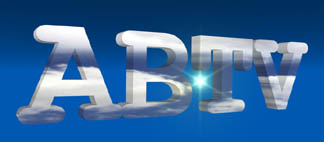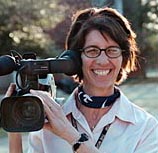I use reporterís notebooks. Sometimes one for each assignment, sometimes several "quickies" go in the same book. I write the story titles on the cover. Some notebooks go to the file with many stories: "Meteorites," "Plutonium," "Cranes," "Afeni Tupac," "Robots," "Hantavirus." Some have only one subject: "WIPP."
October is a busy month for people in TV news. Everyone is shooting for "sweeps," the period during which ratings are used to calculate commercial rate cards for local and network TV. November sweeps are the most important of the year, and producers load their programs with the best they can offer their viewers. Fall is also a time for start-up programming. New series are given a chance to grab a piece of the broadcast or cable audience. Add to that the diversion of resources to the baseball play-offs and elections, and you can see why a "newspuke" knows no rest in autumn. The Sikh program is for the BBC; Iíve spelled it BBC-style in my notebook: the Sikh Programme. The first part of my assignment was a trip to a Sikh community, where I spent the day talking with people---looking for interview subjects. I think itís the best job in the world, to be paid to talk to people. Then, I had to confirm an equipment rental for the upcoming shoot. My boss at the BBC was concerned that our crew have the necessary experience with the gear. "Have they shot PAL?" she asked, referring to the system format used in the UK. "Yes, they have." "Have they shot digi-beta?" she wanted to know. "Yes, theyíve used the digital betacam." "Have they shot wide-screen PAL digi-beta?" "No, they havenít shot wide-screen, but the director has, and itís mostly interview, and we can frame with a monitor, so let me check with the director, because I think weíll be fine." A phone call to the director, in British Columbia, confirmed my expectation. As long as the crew can light and shoot "classical documentary style" the specific technical format is secondary.
I asked about the camera setup. Video cameras can be adjusted for many different "looks," or colorimetry parameters. Thereís a "film look," thereís the "look" of different Sony and Ikegami cameras. It's in the saturation, the crispness, the contrast, the blacks, the detail in fleshtones, all of these elements can be adjusted---plus stuff called "knee and slope" that engineers understand, and the rest of us just see. The rental manager said they have their own setup. It would be wise, I decided, to call the director. If he likes the way the camera looks on his shoot in Canada, we can copy the setup on the camera here. There is a delightful piece of technology: a "setup card" that can be keyed into the digital camera to copy a setup. I closed the "Sikh" notebook, and the phone rang. "Hi, Amy, this is Sharon over at Sunrise. Lee Peach told me you could find a mule for a shoot at the "Rich Ford" dealership next Wednesday." "Sure, I can find you a mule," no problem there. At NBC we sometimes called the audio technician the "sound burro" because the gear was heavy. I wondered if the "mule" was a person, like a strong-backed helper, or maybe she needed a mule mule, like an equine. They needed an equine. I called a person who supplies livestock for commercials and movies. "I have lots of mules now," she said. "Because Iím starting an HBO movie next week. But tell me, what kind of mule do you want?" I figure she has pulling mules, and photo mules, and riding mules and stunt mules. Maybe she has racing mules, or roping mules, or rearing mules, or close-up mules. I gave her the phone number of Sharon,
the production manager. Hey, Iím not that much of a specialist. Iím
only the Television Mule Finder.
 Amy Bowers
|
